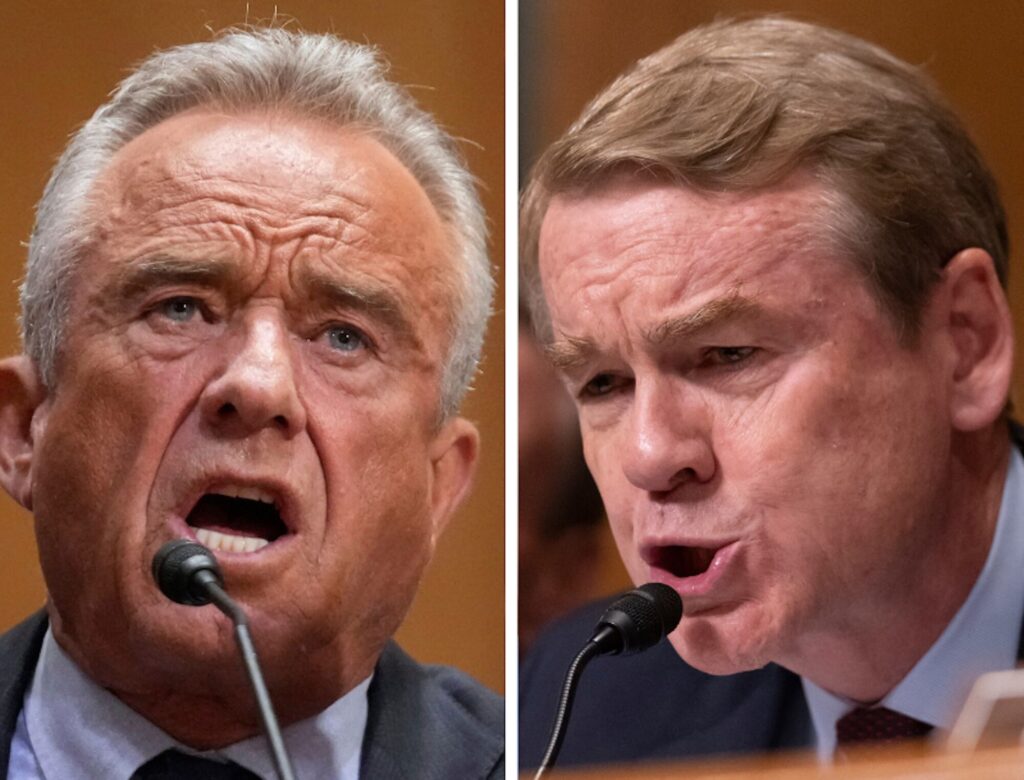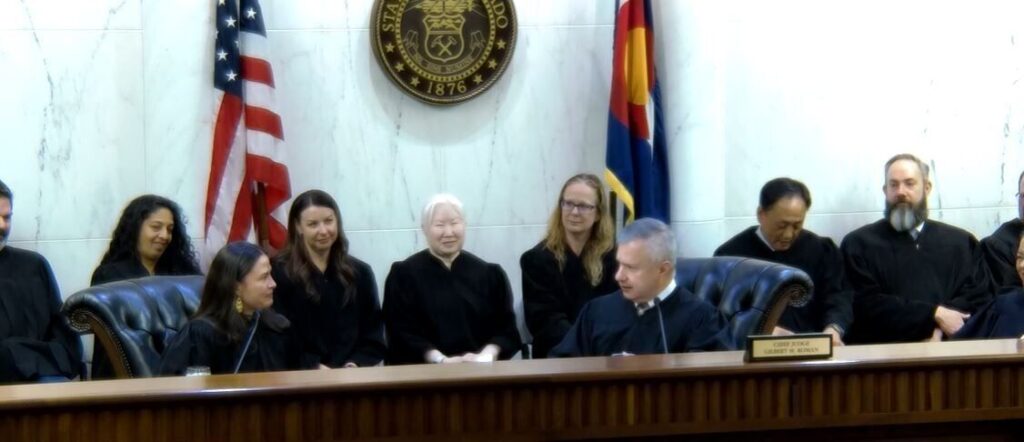No silver bullets: Jim Carpenter stresses fundamentals, agility
Jim Carpenter likes to tell a story about a campaign stop more than two decades ago in a small town on the Eastern Plains. It’s no coincidence the story stars former three-term Colorado Gov. Roy Romer, a man Carpenter describes as the master of quick thinking and innovative approaches to the surprises any politician is sure to encounter.
Romer, a popular incumbent, was in the home stretch of his 1994 reelection bid, facing Republican challenger Bruce Benson. The Democrat’s campaign had scheduled a bus tour across the state, including a stop in Limon, Carpenter recalls, an easy smile growing.
“You have these groups of volunteers who are supposed to make sure there’s a crowd, and they’ve got signs, and you do a rally,” Carpenter says. “Bruce Benson’s campaign had known we were going to Limon, so they went there and they out-organized us. We roll into town and there are more Benson signs than there are Romer signs. The high school band was there, there were lots of people because it was the governor coming to town. We knew we were getting beaten on the signs and the staff was saying, ‘What do we do?'”
That’s when Romer stepped in, demonstrating his agility, says Carpenter, who was one of the staffers riding with the candidate.
“‘Stop the bus!’ Romer said. And he gets out,” Carpenter recalls, shaking his head at the memory. “And he just walks off the bus with a big smile on his face and says, ‘I’m so happy to be in Limon, how many of you would like a sign?’ He starts pulling them off the bus, and all these people are dropping Benson signs and picking up Romer signs. He marched them down the street in a little parade.”
Leaning back, his grin now complete, Carpenter gives a nod. “It was his ability to take a complicated, bad situation and turn it in his favor. That was a great moment of taking something bad and making something good. You gotta do that.”
It’s a signature lesson in the good-humored dexterity any candidate needs, Carpenter notes. “It’s so important to be very open-minded and entrepreneurial and nimble on your feet in politics, because you never know what’s going to hit you when you wake up.”
Take the 2016 election, which Carpenter describes as “different, bizarre, strange,” his eyes widening and then narrowing along with a “can you believe it?” shake of his head.
“I’ve never seen a year like this and I don’t think there’s ever been one,” he says. “We’ll see if there’s any real rules of politics that survive this thing. No matter what happens, our politics are shaken up and are different than they’ve ever been.”
Carpenter has seen plenty of strange and jumbled political seasons. He served as chief of staff to two governors and managed three U.S. Senate campaigns – albeit two of those briefly – and was until recently a partner in Stratton-Carpenter and Associates, the powerhouse consulting firm he formed with fellow legendary Democrat Mike Stratton six years ago. In an amicable split, Carpenter and two of those associates, Kyle Miller and Cody Wertz, established Freestone Strategies earlier this month, hanging a shingle in an office incubator high in a LoDo skyscraper.
The founders say Freestone – it’s named after the kind of river that originates high in the mountains, fed by snowmelt, although Carpenter acknowledges some might think of the peach – will focus on business, nonprofit, political and government clients with interests in natural resources, public lands, renewable energy, climate technology and ecologically sound development.
On a recent morning at a coffee shop in Denver’s Uptown neighborhood, Carpenter talked with The Colorado Statesman about the lessons he’s learned navigating the waters in decidedly purple-hued Colorado going on four decades.
Carpenter, who grew up in Granby, got his start in politics with an unpaid internship with U.S. Rep. Tim Wirth the summer before he started college at Georgetown University in 1978. He continued working at Wirth’s congressional office and then, on his 1980 reelection campaign, staffed an office in the Avondale Shopping Center in West Denver that housed a combined operation for Wirth, U.S. Sen. Gary Hart and state Rep. Federico Peña.
“Federico was unopposed, and he worked unbelievably hard in that campaign, going door to door for Tim and Gary and ultimately setting up his own mayoral run,” Carpenter recalls. “We had this great office that had a Hart-Wirth-Peña sign that Ken Fellman and I nearly killed ourselves hanging over the edge of the building – it was great fun.”
Carpenter stayed with Wirth for three more terms in the House and then as operations manager for the Democrat’s successful 1986 U.S. Senate race. By the time the 1992 reelection was looming, Carpenter was managing his campaign, but Wirth stunned everyone by dropping out in the spring, citing the corrosive influence of big money in politics. (Carpenter managed Wirth’s “un-announcement,” he recalls with a bit of a wry grin.)
“I think Tim was prescient in many ways about the challenges that too much money in politics can bring, the distortions to the system,” Carpenter says. “It makes it very hard to govern and work on issues that you care about. But there’s always been money in politics. We’ve got to keep dealing with it – candidates have to go out there, they’ve got to run and they’ve got to run and they’ve got to push issues.”
Carpenter worked briefly managing the former Colorado Gov. Dick Lamm’s run for the seat – U.S. Rep. Ben Nighthorse Campbell wound up defeating Lamm and Boulder County Commissioner Josie Heath to win the primary and went on to win the seat – and then went back to work in Wirth’s Senate office for the remainder of his term.
After some freelance consulting, he joined Romer’s 1994 campaign, working as communications director with campaign manager Alan Salazar and Stratton, the general consultant. After Romer won his third and final term, he hired Carpenter as press secretary and communications director, a post he held until the summer of 1998, when Romer tapped Carpenter to serve out the last six months of his term as chief of staff.
The years spent working for Romer yielded crucial lessons, Carpenter says.
“I’m so lucky to have worked for the people I’ve worked with, honorable people who I respect and learned a lot from. I learned from Romer how valuable clear and concise communications is. When you’re a leader in any kind of field, you’ve got to be able to tell people what you think and why you’re doing what you’re doing, and bring them along,” Carpenter says.
He says he’d write press releases that would then undergo some stern editing by Romer.
“‘We don’t use those kind of words in Holly, Colorado,” Carpenter recalls the governor would say, invoking the small southeastern Colorado town where Romer grew up. “Holly Colorado was always one word – ‘HollyColorado.'”
Another core Romer principle left a strong impression.
“He was really open to people who saw the world differently than he does,” Carpenter says. “He always tried to understand what was driving them, motivating them, making them think like this – the proverbial ‘meet them on their own terms.’ Roy Romer is smart, he believes very deeply what he believes in, but he understands there’s different points of view there. He used to quote a philosopher – ‘All truth is partial.’ That’s what he thought: ‘I’ve got a core, this is what I believe in, but I understand people have different points of view.’ I think we could use a little bit more of that in politics.”
It’s an approach Colorado politicians would do well to feel in their bones, he adds.
“Colorado is a hardcore purple state, and it’s going to be purple,” Carpenter says. “It swings. We’ve always, throughout our history we’ve always had strong Republicans, strong Democrats, a battle. We’ve had more Democratic governors than Republican governors, we’ve had more Republican legislatures than Democratic legislatures.”
Recalling that he came up in politics when the state’s senators were Hart and Bill Armstrong, then Armstrong and Wirth, Carpenter calls the brief stretches when one or the other party held all the reins anomalies. “Now again with Sen. Michael Bennet, Sen. Cory Gardner, those are people who are, by nature, moderate problem-solvers – again, they believe deeply in something but are not hardcore ideologues, and that’s why Colorado’s politics can be successful.”
Even though Democrats might have romped at the ballot box a few times over the last dozen years, Carpenter cautions against drawing any firm conclusions about the state’s political future.
“We may be trending blue, but we’re independent, and I always say, in Colorado we’re optimistic, forward-looking, independent, and whoever can capture that imagination is going to do really well here,” he says. “But we’re also really skeptical – we don’t buy everything they buy everywhere else. We’re skeptical of the coasts, skeptical of big institutions, and I think all of that’s healthy. But that means we’re competitive. Whenever either side starts thinking they’re the dominant party, that’s when they lose it, they get taken down. I think that’s healthy, and I don’t have any problem with that – going out and competing in that marketplace, I think it works.”
After his stint as Romer’s chief of staff, Carpenter handled public affairs for National Jewish Health, a welcome break from the 18-hour days and regular crises in politics and government.
“It was fun trying to tell those stories,” he says with a grin. “I told the researchers if they could explain it to me, they could explain it to the public, because I didn’t have a clue.”
Carpenter says he only got “a little restless” and envisioned leading a life apart from politics.
“I didn’t think I missed it, but then I got pulled back in,” he says with a laugh. “I didn’t intend to. But Ken Salazar called, is what happened.”
The spring of 2004 turned out to be a lot like the spring of 1992 when Wirth had pulled out of the Senate race right before caucuses. This time, it was Campbell, who had won a second term after switching parties.
“You have a campaign trajectory you think is going to happen, and all of a sudden it doesn’t,” Carpenter recalls. For a few days, confusion reigned as Attorney General Ken Salazar, U.S. Rep. Mark Udall and wealthy politico Rutt Bridges jostled over which Democrat would seek the seat, which had been considered safely in Campbell’s hands.
“Ken called me one morning and said, ‘Come be my quarterback,'” Carpenter says. “I didn’t expect it and wasn’t thinking that was what I was going to do but ended up walking away from a stable job at National Jewish and going back to the campaign.”
After “stumbling out of the gate” – taking second line on the primary ballot behind Mike Miles – “we came roaring back to win the primary,” Carpenter says, and then defeated Republican Pete Coors in general election. “It was a good, fun race in a pretty wild year, where John Kerry was competing here pretty big-time and then pulled out, pulled off television but kept the field operation, which was terrific.”
He says working on the Salazar campaign cemented more key lessons.
“All these campaigns, it starts with the candidate. There’s no substitute for a candidate being hardworking and committed and solid. Ken Salazar worked harder than anybody else. He ran hard for attorney general, when he was the only elected Democrat, in 1998 and again in 2002. Every year as AG he went to all 64 counties in that pickup truck, and he just worked at it, laid the groundwork and built those relationships. It’s fundamentals, it’s blocking and tackling and raising money and visiting voters and talking with people.”
There’s a maxim Carpenter cites: “A staff can lose a campaign but a candidate has to win a campaign. That’s really important.”
But it isn’t just the hardest worker, he adds. “The other thing about campaigns that I’ve always believed, and why people like Roy Romer and Tim (Wirth) and Ken Salazar were so successful, and why people like Barack Obama are so successful, is you do everything you can, you do the fundamentals, and then there’s always the intangible, a little bit of magic, and you just have to capture that.”
Carpenter served as Salazar’s state director for two years and then returned to the Capitol to work as newly elected Gov. Bill Ritter’s chief of staff.
The first two years, he recalls, times were good, the economy hummed along and it was possible to restore funding to higher education, expand health programs and point toward what Ritter termed the New Energy Economy.
“It was a great job, and every day I loved working for Bill Ritter, who is a decent, honorable, great guy,” Carpenter says. “‘I want to do this right, I want a tone in the office that’s open and positive,'” he recalls Ritter saying.
But then the Great Recession hit in 2008, and the economy went into freefall.
“We’re sitting there not knowing where the bottom was,” Carpenter says, shaking his head. Ritter convened “a group of really smart people,” including leading civic figures and economists, who met weekly to figure out how to respond to the growing economic crisis.
“We forget how terrible it was,” Carpenter says. Every day, the budget director would come in and the revenues were crashing. You try to manage the best you can, keep the government going. People forget this, but the stimulus bill saved the country. I know there are some people who will never believe that, never admit it, but it’s true. It brought in significant dollars to the state and stabilized things – it was enough. It was a good lesson that even when things are really bad, you can do some smart stuff, and try to make some long-term changes, like clean energy – but it turned a corner.”
After Ritter decided against seeking a second term, Carpenter joined Stratton’s consulting firm, which the two renamed, and set about the business he’s been doing since.
“The great thing about it is I’m still working on a bunch of different issues I care about, there’s a diversity in what I’m doing. It’s interesting work and it’s a lot of fun. It’s something I can do for a while,” he says.
The focus at Freestone will be similar to the work he and Miller and Wertz did at Stratton-Carpenter.
“Part of what we can do, and we’ve been successful at it, is try to facilitate different kinds of conversations, how people can work together instead of fight about it. On climate, that’s one of those issues that’s gotten way too ideological, and everyone goes to their corners, at least publicly,” Carpenter says. “If you can find ways to talk about managing climate change, people do see how that’ll impact the levels in the Colorado River. In agriculture, they know instinctively that it’s different. Farmers and ranchers are the most practical people around, but they’re not going to get involved in this broader ideological fight. How do you get this conversation going that’s not the deniers or the ‘Chinese hoax’ people or the, ‘We’re all gonna die’ people.”
Carpenter says he’s hopeful the country can deal with the challenges of climate change before it’s too late.
“People in the business community are practical about this,” he says. “Climate change can change the business environment. There’s a company here that does commercial real estate and logistics, globally, that understands that rising sea levels and more intense storms changes the way good are moved and when supplies are needed. One, we gotta plan for what happens, two, we’ve got to plan for resilience, and, three, we’ve got to plan for this in the big picture. We don’t have to change millennials’ minds, they know it, but we’ve got to keep working on these things. You’ve got to be hopeful about these things, we know we can resolve it.”
Discussing the “unbelievable” presidential race between Hillary Clinton and Donald Trump, Carpenter – he’s doing volunteer work for Clinton – mentions another lesson from Romer.
“You don’t get too excited or too freaked out by stuff, you don’t react to what’s happened during the day,” Carpenter says. “Not everything is significant, and it takes a little time to play out. Every campaign has its ups and downs. Trump was always going to come back. But we’re at a point now in the race where that’s already baked and settled. I don’t think it’s over, but I think it’s pretty close to over.”
He says he’s fairly confident Clinton will win Colorado and the presidency, even though the GOP nominee ought to have some built-in advantages, such as the electorate’s reluctance to give a third term to one party. “But voters do what voters do. You have to respect all that,” Carpenter says. “This is a time with a lot of uncertainty, a lot of concern, a lot of worry, and you’ve got to understand that. You don’t get too excited or too down. When things are not going great, Democrats tend to wring their hands more than they should and Republicans buckle down and go back to work. That’s my message to Democrats: don’t wring your hands. If it looks good, don’t freak out, and if it looks bad, just keep going.”
Then Carpenter brings up the last of the hard-learned lesson he’ll mention during the interview.
“We tend to like silver bullets for things,” he says. “But there are no silver bullets, they just don’t exist. There are things that are negative and complicated, and they matter, but in any campaign if you say this one thing is the silver bullet, you’re just wrong.”
Despite this year’s unprecedented zigs and zags, Carpenter says he’s convinced that no one is rewriting the rule book. It’s the fundamentals, he adds, that matter.
“The noise is up here,” he says, raising his hand, “and voters are smart enough to sort all of that out. The lack of a Trump organization – he’s got most Republicans voting for him but not a lot of party infrastructure, and the party elite is nervous about him; the Clinton commitment to register new voters – that matters. These elections are so close – doing everything right is so important. Even if you do everything right, you can still lose, but it’s all important, because you have to do everything right, because you’re working on a margin of a few percent, maybe.”
Recalling the story of Roy Romer leading a parade of sign-waving converts down the street in Limon, Carpenter reiterates the importance of a nimble candidate running atop a solid campaign foundation.
“Whether you’re in a campaign or in the governor’s office, you never know what’s going to hit you,” he says. “You never know.”











